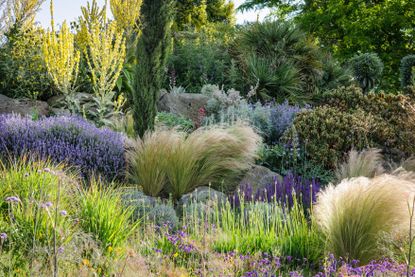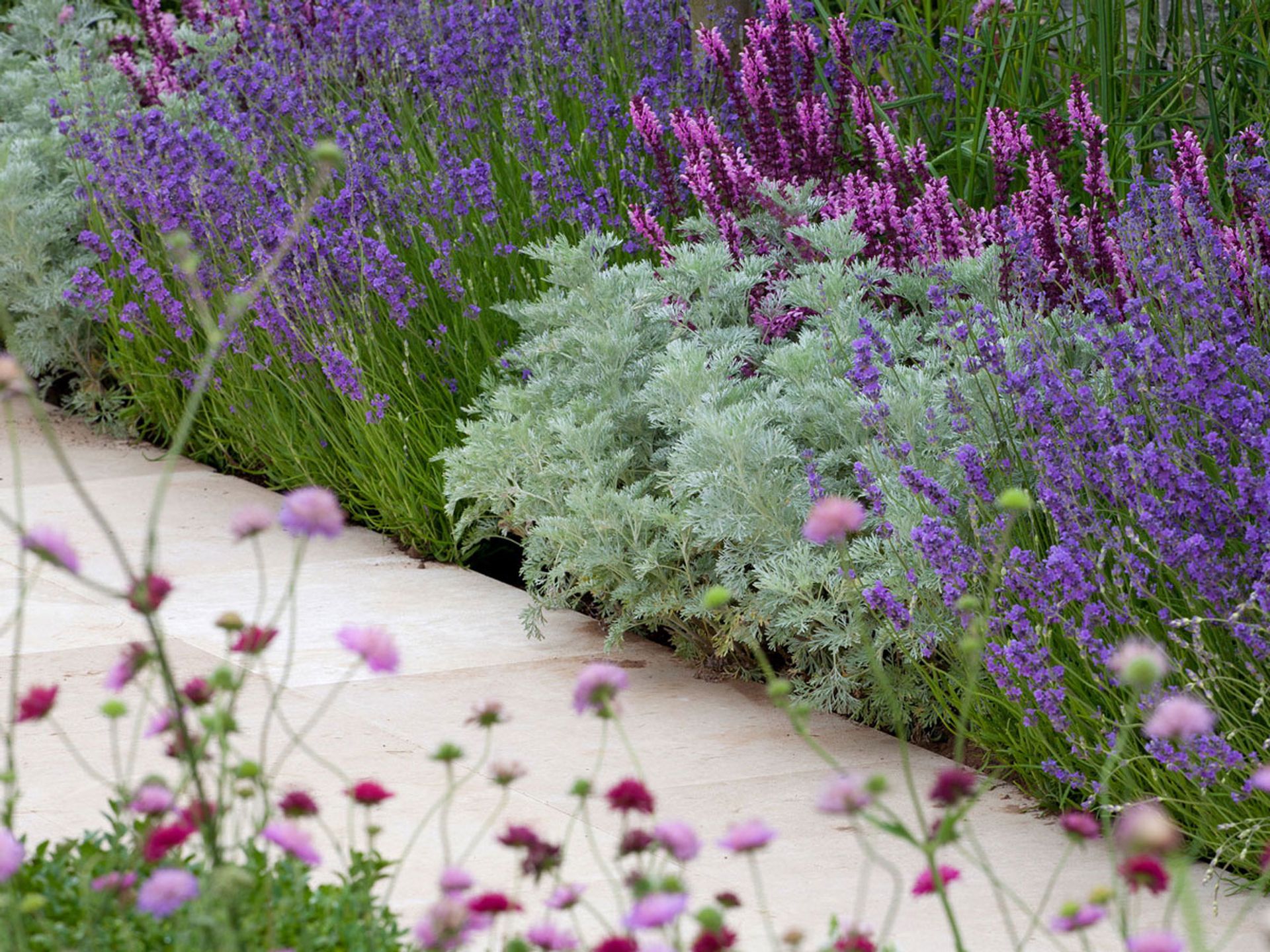When should I prune lavender? How to cut it back for beautiful flowers that keep on blooming
Pruning lavender is essential for encouraging the plant's healthy growth, but you have to know how to get it right. Here's how and when to do it


Lavender is one of our favorite flowers due to its beautiful color, elegant shape, and low maintenance routine. The pungent purple is a striking addition to any space when the humble flower is at its peak. Although the perfect low maintenance plant it requires a little attention to keep it healthy and ensure it comes back blooming next season.
Pruning is an expert gardener's secret to the healthiest-looking lavender ever, but can also be the source of many mistakes. When it comes to the task it can feel like a stab in the dark. "Will the flowers grow back?" is a constant question. Invariably cutting off random parts of the flowers will cause an adverse effect, but leaving them completely will also cause issues.
Luckily we have you covered. Direct from the experts themselves, here are all the things you need to know when pruning lavender.
Why should I prune my lavender?

An annual prune is an essential element of lavender's maintenance routine. In fact, it is the only essential maintenance. Lavender care is extremely simple once you have the basics down.
By cutting off the dead, spent blooms, the plant can rejuvenate and focus all its energy on creating new flowers. ‘The process encourages the plant to produce more flowers and keep it looking fresh,’ says Nikhil Arora, co-founder of Back to the Roots.
Pruning ensures that the structure of your plant remains healthy and that it keeps growing into gloriously scented flowers year after year. It also reduces the chances of the plant becoming too woody, which looks untidy and unhealthy.
When should you prune lavender?

'Timing is key,' says Zahid Adnan from The Plant Bible. There are two times in the year to prune your lavender to maximize the plant's potential to grow. Gardeners have personal preferences as to what time is best to prune, some even do twice a year, but either time is a good start.
'The best time to prune your lavender is in the late summer or early fall, once the plant has finished blooming for the season. This gives the plant ample time to recover and develop new growth before the onset of winter,' Zahid explains.
Equally, some gardeners prefer to prune just as the flowering season begins. 'For optimal blooming prune your lavender right after its first flowering in late spring or early summer. This timing allows the plant to recover and produce new growth before winter,' says expert gardener and founder of Urban Organic Yield, Lindsey Hyland .
Timing is an essential element of the pruning routine. Whether you decide to prune in early summer or early fall, it is more important that you recognize when the task needs to be done. Look for signs of weary spent flowers and overly woody plants as this will help you to determine when to prune.

Size: 1 gallon
Price: $44.95
How much lavender do you prune?
A common pruning mistake, particularly with lavender, is gardeners are often overly cautious of taking too much off. As a result, the pruning does not achieve its desired impact. It is one of the big mistakes made by beginner gardeners, but luckily they are easily rectified. There are a few simple steps to focus on when pruning to ensure you are taking just the right amount off.
'Pruning lavender can be a bit tricky,' says Lindsey, 'you'll want to avoid cutting into the old wood, as lavender has a tough time regrowing from there. Instead, focus
on trimming back the current season's growth. Trim off about one-third to one-half of the length of the stems, cutting just above a set of leaves. This encourages new growth from the base and helps maintain a compact shape.'

When pruning try to maintain the general shape of the plant. 'Lavender tends to become woody and dense over time, so gently trim back any excessive growth to prevent overcrowding and disease,' advises Zahid. This will also prevent you from cutting into the woody stems.
Whilst pruning should only be done once or twice a year, deadheading is a similar process that can be done throughout the season when your flowers look in need of a little refresh. 'Throughout the blooming season, regularly deadhead spent flowers to encourage new blooms. Snip off the faded flower stems just above the first set of healthy leaves to stimulate fresh growth,' explains Zahid. This technique is also useful for caring for indoor lavender plants.
One important thing to remember is to always use sharp, clean pruning shears to make precise cuts and avoid disease transmission.
What to avoid when pruning lavender?
To guarantee your lavender plant produces a rich bloom the following season there are a few things to avoid. Not all pruning is good pruning.
'Avoid pruning lavender during the winter months when the plant is dormant,' says Zahid. 'Cutting back lavender during this period can expose the plant to cold damage, hindering its ability to regrow in the spring.'
It can be tempting to get heavy-handed with the shears and cut the plant excessively. Perhaps with the mindset that it will lead to more flowers in the future, or it will mean pruning is required less frequently. 'Excessive pruning can lead to stress and reduced blooms,' says Zahid, 'aim for a balanced approach to maintain the plant's overall health.'
Needed tools

Size: 75"L X 6"H X 1.75"W
Price: $12.99

Material: bamboo and rubber
Price: $9.49

Size: 11 gallons
Price: $13.99
Be The First To Know
The Livingetc newsletter is your shortcut to the now and the next in home design. Subscribe today to receive a stunning free 200-page book of the best homes from around the world.

Amy recently completed an MA in Magazine Journalism at City, University of London, with experience writing for Women’s lifestyle publications across arts, culture, and beauty. She has a particular love for the minimalist aesthetic mixed with mid-century furniture, especially combining unique vintage finds with more modern pieces. Her previous work in luxury jewellery has given her a keen eye for beautiful things and clever design, that plays into her love of interiors. As a result, Amy will often be heard justifying homeware purchases as 'an investment', wise words to live by.
-
 The 12 Best Table Lamps for Reading —I'm a Certified Bookworm (and Shopping Expert)
The 12 Best Table Lamps for Reading —I'm a Certified Bookworm (and Shopping Expert)When it comes to table lamps for reading, I don't mess around. If you're the same, this edit is for YOU (and your books, or course — and good recommendations?)
By Brigid Kennedy Published
-
 "It's Scandi Meets Californian-Cool" — The New Anthro Collab With Katie Hodges Hits Just the Right Style Note
"It's Scandi Meets Californian-Cool" — The New Anthro Collab With Katie Hodges Hits Just the Right Style NoteThe LA-based interior designer merges coastal cool with Scandinavian simplicity for a delightfully lived-in collection of elevated home furnishings
By Julia Demer Published

